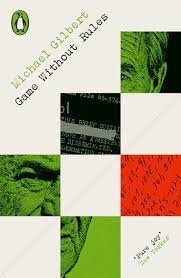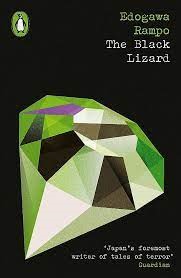Kate at Cross-Examining Crime is once again running her Reprint of the Year competition and both of my choices are from the revived Green Penguin range.
competition and both of my choices are from the revived Green Penguin range.
The first is a collection of short stories featuring Mr Calder and Mr Behrens, two ostensibly retired civil servants, who are still very much active participants in the Cold War.
The Road to Damascus
Mr Calder’s neighbour turns to him when he discovers a skeleton in an old WWII hideout – could this be the body of an old adversary? Or did he manage to change identities during the blitz?
A brilliant ending when Mr Behrens responds to the question of why he is sitting so still.
On Slay Down
Mr Behrens is concerned that the youth of today is mentally and morally softer than his generation and fears for the future of the Service. However Mr Calder discovers a young man who is happy to play outside the rules.
The Spoilers
A number of prominent men have been persuaded to give up their roles in public life but when the conspirators cross a line they get much more than they bargained for. Policeman Patrick Petrella makes a cameo appearance.
The Cat Cracker
“It is not a case in which direct of forceful methods are likely to achieve anything but disaster. It is not a problem which would appeal to Mr Calder. That is why we have turned to you.”
Mr Behrens must persuade a former pupil not to defect.
Trembling’s Tours
The founder, Mr Walcott Trembling, had organised and accompanied tours at a time when a visit to the continent was an adventure, when a tourist expected to be swindled from the moment he arrived at Calais, and a careful family carried its drinking water with it.
New employee Mr Caversham finds that things have changed a lot since the founder’s time.
The Headmaster
A high-ranking intelligence officer accidentally gets too close to the enemy’s top agent, who kills him, thus putting into effect a chain of events that will bring about his downfall.
Heilige Nacht
Mr Calder walked out onto the runway – a thick nondescript figure in a belted mackintosh, carrying a worn airplane flight satchel strapped to one shoulder and the lives of a number of people in his hands.
Mr Calder and Mr Behrens spend Christmas in Berlin.
“Upon the King…”
Mr Behrens finds that a young VIP is more than capable of taking care of himself.
Cross-Over
Mr Behrens and Mr Calder (literally) road test a new piece of technology. A counterpoint to The Cat Cracker.
Prometheus Unbound
Professional agents usually did come to an untimely end. The curious, involute, secretive, occasionally dangerous and always responsible way of life took its sure toll of them. A few were killed by the enemy; others took their own lives; half a dozen, as Mr Fortescue knew, were living in quiet country houses where the furniture was fixed to the floors and the inmates ate with plastic knives and forks and were shaved by a resident barber.
Mr Calder cracks up and not even Mr Behrens or his faithful hound, Rasselas, can help.
A Prince of Abyssinia
“If he was dying, he’d like to take me along with him.”
“What makes you so sure?”
“I tortured him. And I broke him. He’d never forget.”
There is always a price to be paid in the game without rules.
Michael Gilbert had fought in WWII before being held in an Italian prisoner of war camp (the inspiration for the novel “Death in Captivity”) and he and his unlikely heroes are clear about what he fought (and they are fighting) for as evidenced here:
“We’re getting so Security-minded,” said Miss Nicholson, “that we might as well be living in a totalitarian state, under the control of the Gestapo.”
Miss Nicholson, who was an intellectual liberal, often said things like this in letters to the Press and at public meetings, possibly because she had never lived in a totalitarian state and had no experience of the Gestapo…
and then:
“What do you mean by a police state?”
“In Belgrade last year a meeting was called. Not a political meeting. The government did not ban the meeting, they simply gave out that they did not approve…as soon as the meeting started the police blocked all the exits. No one was allowed to leaver until his name and address had been taken and confirmed. For some days nothing happened. Then the police visited every house – there were hundreds, so it took time – and broke every window in every house. It was mid-winter so it wasn’t amusing. That’s what I mean by a police state.”
This is an excellent short story collection and on the strength of it I have bought three more Gilbert anthologies.


 theYear
theYear